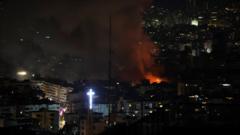Following the change in Syrian leadership, both nations aim to stabilize the volatile situation exacerbated by their competing interests.
**Turkey and Israel Engage in Dialogue to Prevent Military Tensions in Syria**

**Turkey and Israel Engage in Dialogue to Prevent Military Tensions in Syria**
In light of escalating regional rivalry, Turkey and Israel initiate discussions to avoid military clashes in Syria.
In a significant move, Turkey and Israel have commenced talks aimed at diffusing tensions between their military forces in Syria. The discussions, held in Azerbaijan, come amid an Israeli offensive and an increasing contest for influence in the war-torn region. The Turkish Defense Ministry emphasized that the meeting sought to devise mechanisms to avoid unintended confrontations. Meanwhile, Israeli Prime Minister Benjamin Netanyahu's office confirmed a commitment to maintaining an ongoing dialogue with their Turkish counterparts.
These discussions precede an important visit from President Ahmed al-Shara, Syria’s newly appointed leader, who is expected to meet with Turkish officials to discuss matters of security and military collaboration. Al-Shara, who leads a rebel coalition supported by Turkey, played a pivotal role in overthrowing long-time President Bashar al-Assad in December, resulting in the withdrawal of Assad's key allies, Russia and Iran, from Syria.
With a power vacuum now present, Turkey and Israel are intensifying their efforts to secure influence over various factions in Syria, further complicating the situation. The instability is compounded by the ongoing challenges faced by the new Syrian administration trying to stabilize a country scarred by 13 years of civil conflict.
Turkey has long maintained a presence in northern Syria, fostering opposition against Assad's regime while simultaneously addressing the perceived threats from Kurdish rebels. Recent reports indicate that Turkey has proposed training a new Syrian military and enhancing the country’s military infrastructure, although confirmations from the Syrian government remain absent.
In response to the changing landscape, Israel has stepped up its military presence in a traditional buffer zone along the Golan Heights, conducting numerous airstrikes targeting Syrian military sites. This escalation in military operations underscores the urgency of dialogue as both nations seek to navigate the complexities of a post-Assad Syria.
These discussions precede an important visit from President Ahmed al-Shara, Syria’s newly appointed leader, who is expected to meet with Turkish officials to discuss matters of security and military collaboration. Al-Shara, who leads a rebel coalition supported by Turkey, played a pivotal role in overthrowing long-time President Bashar al-Assad in December, resulting in the withdrawal of Assad's key allies, Russia and Iran, from Syria.
With a power vacuum now present, Turkey and Israel are intensifying their efforts to secure influence over various factions in Syria, further complicating the situation. The instability is compounded by the ongoing challenges faced by the new Syrian administration trying to stabilize a country scarred by 13 years of civil conflict.
Turkey has long maintained a presence in northern Syria, fostering opposition against Assad's regime while simultaneously addressing the perceived threats from Kurdish rebels. Recent reports indicate that Turkey has proposed training a new Syrian military and enhancing the country’s military infrastructure, although confirmations from the Syrian government remain absent.
In response to the changing landscape, Israel has stepped up its military presence in a traditional buffer zone along the Golan Heights, conducting numerous airstrikes targeting Syrian military sites. This escalation in military operations underscores the urgency of dialogue as both nations seek to navigate the complexities of a post-Assad Syria.




















